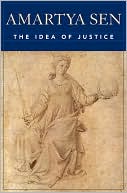The Idea of Justice
Search in google:
Social justice: an ideal, forever beyond our grasp; or one of many practical possibilities? More than a matter of intellectual discourse, the idea of justice plays a real role in how—and how well—people live. And in this book the distinguished scholar Amartya Sen offers a powerful critique of the theory of social justice that, in its grip on social and political thinking, has long left practical realities far behind.The transcendental theory of justice, the subject of Sen’s analysis, flourished in the Enlightenment and has proponents among some of the most distinguished philosophers of our day; it is concerned with identifying perfectly just social arrangements, defining the nature of the perfectly just society. The approach Sen favors, on the other hand, focuses on the comparative judgments of what is “more” or “less” just, and on the comparative merits of the different societies that actually emerge from certain institutions and social interactions.At the heart of Sen’s argument is a respect for reasoned differences in our understanding of what a “just society” really is. People of different persuasions—for example, utilitarians, economic egalitarians, labor right theorists, no-nonsense libertarians—might each reasonably see a clear and straightforward resolution to questions of justice; and yet, these clear and straightforward resolutions would be completely different. In light of this, Sen argues for a comparative perspective on justice that can guide us in the choice between alternatives that we inevitably face. Paula Newberg - Globe and Mail The Idea of Justice is...grand in the best sense of the word, taking on difficult subjects, and respectfully following centuries of philosophical debate while imaginatively rethinking them...[It] will undoubtedly set many future agendas for social research...The Idea of Justice marries economic and political analysis to moral reasoning, and this is among the most important elements of this volume...The Idea of Justice transcends political convention, expansively and elegantly. Read it front to back as a logical rethinking of classical political theory; read it back to front as an agenda of pressing, shared concerns. Either way, this is a volume worth its considerable weight and length. In an era typified by increasingly contentious politics, violent challenges to states and societies, and elusive (and often ignored) norms for global political engagement, The Idea of Justice is a call for civility in the best sense of the word, and a model of gracious intellectual engagement.
PrefaceAcknowledgementsIntroduction: An Approach to JusticePart I: The Demands of JusticeReason and ObjectivityRawls and BeyondInstitutions and PersonsVoice and Social ChoiceImpartiality and ObjectivityClosed and Open ImpartialityPart II: Forms of ReasoningPosition, Relevance and IllusionRationality and Other PeoplePlurality of Impartial ReasonsRealizations, Consequences and AgencyPart III: The Materials of JusticeLives, Freedoms and CapabilitiesCapabilities and ResourcesHappiness, Well-being and CapabilitiesEquality and LibertyPart IV: Public Reasoning and DemocracyDemocracy as Public ReasonThe Practice of DemocracyHuman Rights and Global ImperativesJustice and the WorldNotesName IndexSubject Index








